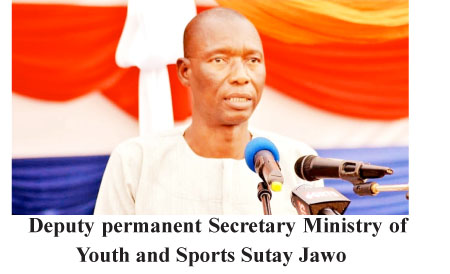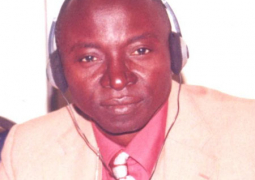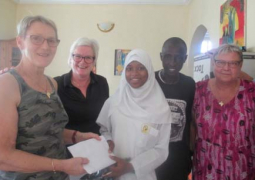
Out
of the D21.2 billion approved by the National Assembly as government budgetfor
the year 2020, D113.3 million is for the Ministry of Youth and Sports (MoYS).
But
Sutay Jawo, Deputy Permanent Secretary (DPS), MoYS, said the 2020 budget
allocated for the youth sector is small compared to other ministries when the
country has a youthful population.
Statistics
have shown that over 60 percent of Gambia’s populations is youth.
“This
clearly shows that the youth sector deserves a bigger budget but MoYS received
half-baked cake from the government allocations,” Mr. Jawo said.
“Whenever
we present our budget to the Ministry of Finance, we are regarded as a small
ministry when that is not the case,” he argued.
The
DPS pointed out that the reduction of MoYS 2020 budget would “greatly affect”
the implementation of planned youth programmes on irregular migration and
skills apprenticeship.
Jawo
cautioned that addressing these programmes by the ministry and its satellite
institutions would be affected.
He
said one of the main challenges of MoYS, in addition to the budget shortfall,
is that the allocated funds are hardly released on time.
“The
ministry finds it very difficult to receive funds from the Ministry of Finance.
Our funds are not disbursed timely,” he lamented.
According
to him, in some cases, the ministry’s satellite institutions will send a
request to Ministry of Finance, but before the funds are received, the deadline
for the planned activities would have elapsed.
The
four satellite institutions of MoYS are: National Youth Council (NYC), National
Youth Service Scheme (NYSS), National Enterprise Development Initiative (NEDI),
and the President International Award Scheme (PIA).
“It
is always a stumbling block for MoYS and its satellite institutions to get its
already approved budget from the Ministry of Finance,” the DPS disclosed.
“This
should not be the case. Why do we have to be following-up a request for weeks
or months?” he rhetorically asked.
Mr.
Jawo noted that there is a need for other ministries that have programmes for
youth to merge these programmes.
For
example, he said, there are programmes for youth focusing on agriculture
through Ministry for Agriculture; so it would have been prudent for the
ministries of agriculture and that of youth, to consolidate their youth
programmes to maximize resources and outcome in favour of the youth.
As
part of the internal consolidation drive, the MoYS Policy and all other Acts
governing MoYS’ satellite institutions would be matched to minimize costs.
Jawo
disclosed that the Gambia Songhai Initiative (GSI) in Chamen, North Bank Region
would be replicated in Kundam village, Upper River Region.
A
youth activist, Saiba T. Susso, said the country is at a crossroad as a result
of heavy dependence on grants and loans to develop the economy.
“This
is not sustainable,” he said, adding that the impact of all the grants and
loans the country is receiving from development partners is hardly felt on the
youth, in terms of creating the much needed employment and essential vocational
skills.
“Mismanagement
of funds through corruption has become the order of the day,” Suso said.
“Considering
the grants and loans received by the government, the poverty level in this
country should drastically reduce now,” Mr Suso said.
“But the contrary is true; the poverty level
is increasing daily.”
Executive Director of the National Youth Council
(NYC), Lamin Darboe, believed that the budget allocation for MoYS “is not
proportionate at all.
The
budget allocation to the youth is not enough and the government needs to do
more for the young people”.
The
senior NYC official continued: “If our young people do not have opportunity
here, there will be more (young) from rural to urban or from urban to other
parts of the world for greener pasture.
”
Darboe expressed concern with the fact the total amount of funds approved for
MoYS and its satellite institutions for 2019 were not disbursed.
“We
did not receive the entire funds allocated for the NYC in 2019 and it has been
the case throughout,” he lamented.
“Last
week (11th December, 2019) all the satellite institutions of MoYS were at the
Ministry of Finance requesting for our allocation because we need it to spend
on our services but up to the time of this interview, we are yet to receive the
money,” he revealed.
Sabally
described the youth sector as the “most vulnerable” when it comes to budget
allocation.
He
cautioned the government to focus on development programmes and projects that
could create jobs, particularly for the youth folk.
“If
we do not address youth issues, we will continue to witness expulsions like the
recent boat tragedy of which over 60 Gambian youth died,” he echoed.
For
the economist, the government is not taking youth issues seriously because the
youth sector received the least allocation in the 2020 budget.




